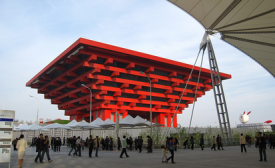image

In my new book, “Shaping China’s Global Imagination: Branding Nations at the World Expo,” I explore the idea of nation branding—what it is and how it works—through the instructive case of the Shanghai World Expo. Despite the growing interest in how countries promote their national image, the potential and role of branding in a nation’s communication has often been assumed but not demonstrated. This book reflects an effort to provide conceptual clarity and empirical attention to this very issue.
As international attention focuses on the Sochi Winter Olympics, the big question is whether security will hold, even with Russia's draconian response, which has included bringing in more than 30,000 additional troops and police, sealing off the city and closing nearby international border crossings to try to counter Islamist insurgents’ threats to attack the games themselves. Yet whatever happens in February, Sochi will have longer term implications for Russian politics, society and its economic fortunes.
Two suicide bombings in as many days have raised concerns that separatist militants have begun a terrorist campaign in Russia that could stretch into the Winter Olympics in February. Russian authorities and the International Olympic Committee insisted the site of the games, protected by layers of security, is completely safe.
The two remaining imprisoned Pussy Riot members were released from prison Monday under Russia’s new amnesty law. The pair slammed the move, and accused President Vladimir Putin of freeing them as a public relations effort meant to smooth out international human rights criticisms ahead of the winter Olympics.
"America is a large, friendly dog in a very small room," observed British historian Arnold J. Toynbee. "Every time it wags its tail, it knocks over a chair." And Spanish poet Federico Garcia Lorca said, "The only things that the United States has given to the world are skyscrapers, jazz, and cocktails." Opinions of America are like bellybuttons — everybody's got one.
Dear Mr. President: It is with great respect for you and your office that I write this open letter. I have covered the Olympic movement for 15 years. The Sochi 2014 Winter Olympics will be my eighth Games. I will remind you that in 1980, the last time the Olympic Games were in what is now the Russia, what was then the Soviet Union, the United States team did not go amid intense pressure from the White House.
Russia will increase spending on foreign cultural and educational projects as part of the Kremlin-backed 'Soft Power' concept aimed at improving the country's image abroad, a news report said Wednesday.
From Beijing’s vantage point, such foreign concerns reflect misconceptions over its intentions as a rising power. And Xi appears to recognize that this is exacerbated by a broader deficit in China’s global soft power (that is, the ability to persuade other countries and foreign publics through attraction and co-option rather than coercion, use of force, or payment).To be sure, Beijing has invested many billions of pounds in recent years on foreign charm offensives, and has achieved some significant successes (remember the 2008 Olympics for instance).







